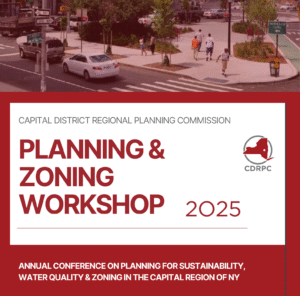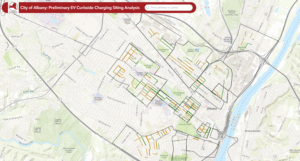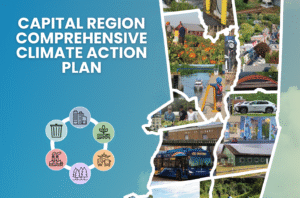2022 Workshop
View the 2022 Workshop Program to see the Agenda, Speaker Biographies, and Session Descriptions.
Plenary Session
Recreational Marijuana Implications for Planning and Zoning in NYS
This session provided an overview of the provisions of the law that will impact planning and zoning decision-making, highlighted the discretion communities have while implementing the law, foreshadowed the regulatory landscape, and explored lessons learned from other states that have initiated recreational cannabis.
Session Speakers: Wade Beltramo & David O’Brien
Research & Innovation Sessions
Climate Resiliency in Albany County: Data, Strategies, and Funding Sources
This session provided an overview of the Albany County Climate Resiliency Plan. The presentation described the datasets developed as part of this project to map flood risk, heat vulnerability, and social vulnerability down to the parcel-level for all of Albany County. The presentation also described how these datasets can be used by municipalities to inform future decision-making, proactively identify projects and policies that reduce risks related to climate change and apply for future funding. To illustrate how the data can be used, several proposed projects identified as part of the planning process were discussed and used to convey best practices related to climate resiliency (e.g., green infrastructure, open space acquisition and preservation in flood prone areas). The presentation also highlighted the disproportionate impacts socially vulnerable populations will face as the climate changes as well as several state and federal funding sources available to support climate resiliency work.
Session Speaker: Elizabeth Podowski King
Adapting Planning Board Procedures for the Digital Age
The Bipartisan Infrastructure Law introduced numerous grant programs for transportation planning and project development. Attendees learned about the new Law and how the Capital District Transportation Committee (CDTC) can help communities plan for the next generation transportation system.
Session Speakers: Helen Budrock & Jim Carnell
Next Generation Transportation Planning Resources
The goal of this session was to provide guidance on how to prepare an administrative record to withstand an Article 78 challenge to a decision by a legislative body or by a land use board. Recent notable cases were reviewed and discussed in detail to evaluate how judges are examining administrative records of decisions on basic types of approvals such as adoption of changes to zoning codes, compliance with SEQRA, decisions to grant or deny site plan, subdivision and special use permits and decisions to grant or deny requests for use and/or area variances. Principals were drawn from these cases to assist these Boards in future decision-making.
Session Speaker: Sandra Misiewicz
Policy & Strategy Sessions
Ethical Considerations for Boards
This session was an interactive discussion of the legal and ethical issues involved in the decision‐making process of planning boards and ZBAs.
Session Speaker: Mark Schachner
Planning Case Law Update
The goal of this session was to provide guidance on how to prepare an administrative record to withstand an Article 78 challenge to a decision by a legislative body or by a land use board. Recent notable cases were reviewed and discussed in detail to evaluate how judges are examining administrative records of decisions on basic types of approvals such as adoption of changes to zoning codes, compliance with SEQRA, decisions to grant or deny site plan, subdivision and special use permits and decisions to grant or deny requests for use and/or area variances. Principals were drawn from these cases to assist these Boards in future decision-making.
Session Speaker: Terresa M. Bakner
Climate Action Planning
Communities, municipalities, and planning and zoning boards are becoming increasingly interested in coordinating a response to climate change. They develop Climate Action Plans to mitigate emissions of Greenhouse Gases (GHGs) and to prepare for expected changes to the climate. Interest is growing fast. New York’s Climate Smart Communities program, a technical resource and grant program coordinated by NY’s Department of Environmental Conservation has roughly 150 municipalities participating. It is also supported by CDRPC.
Session Speaker: Jim Yienger
Education & Outreach Sessions
Short-Term Rentals: Balancing Local Impacts and Economic Benefits
(STR) continue to gain in popularity as a convenient option for vacationers, business travelers people seeking a weekend gateway. Unfortunately, perceived and actual impacts on neighborhoods, community character and the availability of affordable housing continues to grow as well. While STR may have reinvigorated local tourism markets throughout the state, more and more communities are facing an important choice – should we take a hands-off approach for the benefit of our economy, or should we more strictly regulate STR to preserve local community character and keep local residents from being priced out? This session offered a snapshot of local and regional STR markets, positive and negative impacts to local communities, and how various municipalities haven chosen to address the issue.
Session Speakers: Kevin Schwenzfeier & Nicole Allen
Hot Topics and Comprehensive Planning for Small Towns
This session overviewed hot topics that many small and rural communities are grappling with and how to include them in comprehensive planning efforts. Topics such as solar farms, short term rentals, climate change, and affordable housing are significant issues facing many communities and this session introduced participants to the planning toolboxes available to address them. The session also introduced APA’s Sustaining Places: Best Practices for Comprehensive Plans and offered tips on creating or updating a small town comprehensive plan. Participants had time for Q and A on these and other small town planning topics.
Session Speaker: Nan Stolzenburg
Stormwater Management Plan Review, Regulatory, and Implementation
This session overviewed hot topics that many small and rural communities are grappling with and how to include them in comprehensive planning efforts. Topics such as solar farms, short term rentals, climate change, and affordable housing are significant issues facing many communities and this session introduced participants to the planning toolboxes available to address them. The session also introduced APA’s Sustaining Places: Best Practices for Comprehensive Plans and offered tips on creating or updating a small town comprehensive plan. Participants had time for Q and A on these and other small town planning topics.
Session Speakers: Brad Grant & Nadine Medina


